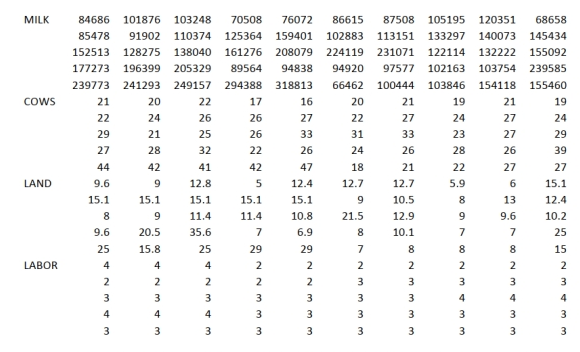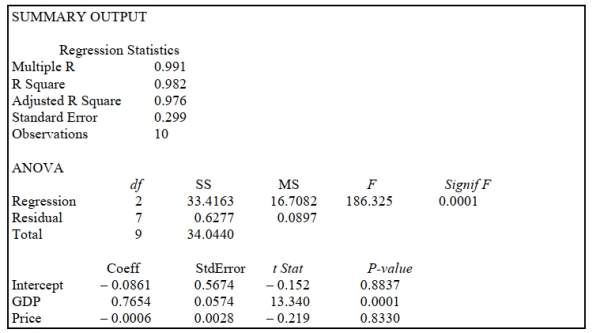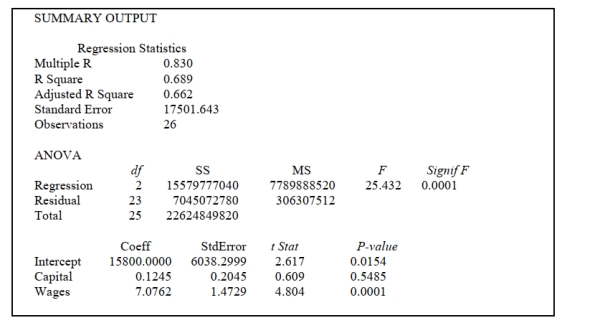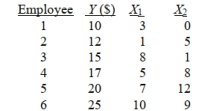Exam 14: Introduction to Multiple
Exam 1: Defining and Collecting Data202 Questions
Exam 2: Organizing and Visualizing256 Questions
Exam 3: Numerical Descriptive Measures217 Questions
Exam 4: Basic Probability167 Questions
Exam 5: Discrete Probability Distributions165 Questions
Exam 6: The Normal Distribution and Other Continuous Distributions170 Questions
Exam 7: Sampling Distributions165 Questions
Exam 8: Confidence Interval Estimation219 Questions
Exam 9: Fundamentals of Hypothesis Testing: One-Sample Tests194 Questions
Exam 10: Two-Sample Tests240 Questions
Exam 11: Analysis of Variance170 Questions
Exam 12: Chi-Square and Nonparametric188 Questions
Exam 13: Simple Linear Regression243 Questions
Exam 14: Introduction to Multiple394 Questions
Exam 15: Multiple Regression146 Questions
Exam 16: Time-Series Forecasting235 Questions
Exam 17: Getting Ready to Analyze Data386 Questions
Exam 18: Statistical Applications in Quality Management159 Questions
Exam 19: Decision Making126 Questions
Exam 20: Probability and Combinatorics421 Questions
Select questions type
SCENARIO 14-20-B
You are the CEO of a dairy company. You are planning to expand milk production by purchasing
additional cows, lands and hiring more workers. From the existing 50 farms owned by the company,
you have collected data on total milk production (in liters), the number of milking cows, land size (in
acres) and the number of laborers. The data are shown below and also available in the Excel file
Scenario14-20-DataB.XLSX.
MILK 84686 101876 103248 70508 76072 86615 87508 105195 120351 68658  You believe that the number of milking cows , land size and the number of laborers are the best predictors for total milk production on any given farm.
-Referring to Scenario 14-20-B, which of the following is the correct alternative hypothesis to test whether the number of laborers has any effect on the total milk production while holding
Constant the effect of the other independent variables?
S a)
b)
c)
d)
You believe that the number of milking cows , land size and the number of laborers are the best predictors for total milk production on any given farm.
-Referring to Scenario 14-20-B, which of the following is the correct alternative hypothesis to test whether the number of laborers has any effect on the total milk production while holding
Constant the effect of the other independent variables?
S a)
b)
c)
d)
(Short Answer)
4.9/5  (35)
(35)
SCENARIO 14-13
An econometrician is interested in evaluating the relationship of demand for building materials to
mortgage rates in Los Angeles and San Francisco. He believes that the appropriate model is
where
where = mortgage rate in \% =1 if SF, 0 if LA Y= demand in \ 100 per capita
-Referring to Scenario 14-13, the effect of living in San Francisco rather than Los Angeles is to
increase the mean demand by an estimated ________.
(Short Answer)
4.8/5  (33)
(33)
SCENARIO 14-20-B
You are the CEO of a dairy company. You are planning to expand milk production by purchasing
additional cows, lands and hiring more workers. From the existing 50 farms owned by the company,
you have collected data on total milk production (in liters), the number of milking cows, land size (in
acres) and the number of laborers. The data are shown below and also available in the Excel file
Scenario14-20-DataB.XLSX.
MILK 84686 101876 103248 70508 76072 86615 87508 105195 120351 68658  You believe that the number of milking cows , land size and the number of laborers are the best predictors for total milk production on any given farm.
-Referring to Scenario 14-20-B, the lower and upper limits of the 95% prediction interval for the
total milk production of a farm with 40 milking cows, 30 acres of land and 3 laborers are _____
liters and _____ liters, respectively.
You believe that the number of milking cows , land size and the number of laborers are the best predictors for total milk production on any given farm.
-Referring to Scenario 14-20-B, the lower and upper limits of the 95% prediction interval for the
total milk production of a farm with 40 milking cows, 30 acres of land and 3 laborers are _____
liters and _____ liters, respectively.
(Short Answer)
4.7/5  (34)
(34)
SCENARIO 14-20-B
You are the CEO of a dairy company. You are planning to expand milk production by purchasing
additional cows, lands and hiring more workers. From the existing 50 farms owned by the company,
you have collected data on total milk production (in liters), the number of milking cows, land size (in
acres) and the number of laborers. The data are shown below and also available in the Excel file
Scenario14-20-DataB.XLSX.
MILK 84686 101876 103248 70508 76072 86615 87508 105195 120351 68658  You believe that the number of milking cows , land size and the number of laborers are the best predictors for total milk production on any given farm.
-Referring to Scenario 14-20-B, construct the normal probability plot for the regression
residuals.
You believe that the number of milking cows , land size and the number of laborers are the best predictors for total milk production on any given farm.
-Referring to Scenario 14-20-B, construct the normal probability plot for the regression
residuals.
(Essay)
5.0/5  (39)
(39)
14-22 Introduction to Multiple Regression One of the most common questions of prospective house buyers pertains to the cost of heating in dollars . To provide its customers with information on that matter, a large real estate firm used the following 2 variables to predict heating costs: the daily minimum outside temperature in degrees of Fahrenheit and the amount of insulation in inches . Given below is EXCEL output of the regression model.
Regression Statistics Multiple R 0.5270 R Square 0.2778 Adjusted R Square 0.1928 Standard Error 40.9107 Observations 20
ANOVA
 Coefficients Standard Error t Stat P-value Lower 95\% Upper 95\% Intercept 448.2925 90.7853 4.9379 0.0001 256.7522 639.8328 Temperature -2.7621 1.2371 -2.2327 0.0393 -5.3721 -0.1520 Insulation -15.9408 10.0638 -1.5840 0.1316 -37.1736
Also and
-Referring to Scenario 14-6, the value of the partial F test statistic is ____ for : Variable does not significantly improve the model after variable has been included
: Variable significantly improves the model after variable has been included
Coefficients Standard Error t Stat P-value Lower 95\% Upper 95\% Intercept 448.2925 90.7853 4.9379 0.0001 256.7522 639.8328 Temperature -2.7621 1.2371 -2.2327 0.0393 -5.3721 -0.1520 Insulation -15.9408 10.0638 -1.5840 0.1316 -37.1736
Also and
-Referring to Scenario 14-6, the value of the partial F test statistic is ____ for : Variable does not significantly improve the model after variable has been included
: Variable significantly improves the model after variable has been included
(Short Answer)
4.9/5  (28)
(28)
SCENARIO 14-3
An economist is interested to see how consumption for an economy (in $ billions) is influenced by
gross domestic product ($ billions) and aggregate price (consumer price index). The Microsoft Excel
output of this regression is partially reproduced below.  -Referring to Scenario 14-3, what is the estimated mean consumption level for an economy with GDP equal to $4 billion and an aggregate price index of 150?
-Referring to Scenario 14-3, what is the estimated mean consumption level for an economy with GDP equal to $4 billion and an aggregate price index of 150?
(Multiple Choice)
4.8/5  (32)
(32)
SCENARIO 14-20-B
You are the CEO of a dairy company. You are planning to expand milk production by purchasing
additional cows, lands and hiring more workers. From the existing 50 farms owned by the company,
you have collected data on total milk production (in liters), the number of milking cows, land size (in
acres) and the number of laborers. The data are shown below and also available in the Excel file
Scenario14-20-DataB.XLSX.
MILK 84686 101876 103248 70508 76072 86615 87508 105195 120351 68658  You believe that the number of milking cows , land size and the number of laborers are the best predictors for total milk production on any given farm.
-Referring to Scenario 14-20-B, there is sufficient evidence that at least one of the
explanatory variables is related to total milk production at a 1% level of significance when testing
whether there is a significant relationship between total milk production and the entire set of
explanatory variables.
You believe that the number of milking cows , land size and the number of laborers are the best predictors for total milk production on any given farm.
-Referring to Scenario 14-20-B, there is sufficient evidence that at least one of the
explanatory variables is related to total milk production at a 1% level of significance when testing
whether there is a significant relationship between total milk production and the entire set of
explanatory variables.
(True/False)
4.8/5  (30)
(30)
SCENARIO 14-8 A financial analyst wanted to examine the relationship between salary (in ) and 2 variables: age and experience in the field Exper). He took a sample of 20 employees and obtained the following Microsoft Excel output:
Regression Statistics Multiple R 0.8535 R Square 0.7284 Adjusted R Square 0.6964 Standard Error 10.5630 Observations 20
 Coefficients Standard Error t Stat P-value Lower 95\% O5\% Intercept 1.5740 9.2723 0.1698 0.8672 -17.9888 21.1368 Age 1.3045 0.1956 6.6678 0.0000 0.8917 1.7173 Exper -0.1478 0.1944 -0.7604 0.4574 -0.5580 0.2624
Also the sum of squares due to the regression for the model that includes only Age is 5022.0654 while the
sum of squares due to the regression for the model that includes only Exper is 125.9848.
-Referring to Scenario 14-8, the value of the partial F test statistic is ____ for : Variable does not significantly improve the model after variable has been included
: Variable significantly improves the model after variable has been included
Coefficients Standard Error t Stat P-value Lower 95\% O5\% Intercept 1.5740 9.2723 0.1698 0.8672 -17.9888 21.1368 Age 1.3045 0.1956 6.6678 0.0000 0.8917 1.7173 Exper -0.1478 0.1944 -0.7604 0.4574 -0.5580 0.2624
Also the sum of squares due to the regression for the model that includes only Age is 5022.0654 while the
sum of squares due to the regression for the model that includes only Exper is 125.9848.
-Referring to Scenario 14-8, the value of the partial F test statistic is ____ for : Variable does not significantly improve the model after variable has been included
: Variable significantly improves the model after variable has been included
(Short Answer)
4.8/5  (33)
(33)
SCENARIO 14-20-B
You are the CEO of a dairy company. You are planning to expand milk production by purchasing
additional cows, lands and hiring more workers. From the existing 50 farms owned by the company,
you have collected data on total milk production (in liters), the number of milking cows, land size (in
acres) and the number of laborers. The data are shown below and also available in the Excel file
Scenario14-20-DataB.XLSX.
MILK 84686 101876 103248 70508 76072 86615 87508 105195 120351 68658  You believe that the number of milking cows , land size and the number of laborers are the best predictors for total milk production on any given farm.
-Referring to Scenario 14-20-B, the lower and upper limits of the 95% confidence interval for
the mean total milk production of a farm with 30 milking cows, 20 acres of land and 3 laborers
are _____ liters and _____ liters, respectively.
You believe that the number of milking cows , land size and the number of laborers are the best predictors for total milk production on any given farm.
-Referring to Scenario 14-20-B, the lower and upper limits of the 95% confidence interval for
the mean total milk production of a farm with 30 milking cows, 20 acres of land and 3 laborers
are _____ liters and _____ liters, respectively.
(Short Answer)
4.8/5  (43)
(43)
SCENARIO 14-5
A microeconomist wants to determine how corporate sales are influenced by capital and wage
spending by companies. She proceeds to randomly select 26 large corporations and record
information in millions of dollars. The Microsoft Excel output below shows results of this multiple
regression.  -Referring to Scenario 14-5, suppose the microeconomist wants to test whether the coefficient on Capital is significantly different from 0. What is the value of the relevant t-statistic?
-Referring to Scenario 14-5, suppose the microeconomist wants to test whether the coefficient on Capital is significantly different from 0. What is the value of the relevant t-statistic?
(Multiple Choice)
4.9/5  (38)
(38)
SCENARIO 14-3
An economist is interested to see how consumption for an economy (in $ billions) is influenced by
gross domestic product ($ billions) and aggregate price (consumer price index). The Microsoft Excel
output of this regression is partially reproduced below.  -Referring to Scenario 14-3, to test whether gross domestic product has a positive impact on consumption, the p-value is
-Referring to Scenario 14-3, to test whether gross domestic product has a positive impact on consumption, the p-value is
(Multiple Choice)
4.9/5  (41)
(41)
SCENARIO 14-2 A professor of industrial relations believes that an individual's wage rate at a factory depends on his performance rating and the number of economics courses the employee successfully completed in college . The professor randomly selects 6 workers and collects the following information:
 -Referring to Scenario 14-2, for these data, what is the value for the regression constant, b0?
-Referring to Scenario 14-2, for these data, what is the value for the regression constant, b0?
(Multiple Choice)
4.7/5  (33)
(33)
SCENARIO 14-17
Given below are results from the regression analysis where the dependent variable is the number of
weeks a worker is unemployed due to a layoff (Unemploy) and the independent variables are the age
of the worker (Age) and a dummy variable for management position (Manager: 1 = yes, 0 = no).
The results of the regression analysis are given below: \ Regression Statistics Multiple R 0.6391 R Square 0.4085 Adjusted R Square 0.3765 Standard Error 18.8929 Observations 40
 Coefficients Standard Error t Stat P-value Intercept -0.2143 11.5796 -0.0185 0.9853 Age 1.4448 0.3160 4.5717 0.0000 Manager -22.5761 11.3488 -1.9893 0.0541
-Referring to Scenario 14-17, what is the value of the test statistic to determine whether there is
a significant relationship between the number of weeks a worker is unemployed due to a layoff
and the entire set of explanatory variables?
Coefficients Standard Error t Stat P-value Intercept -0.2143 11.5796 -0.0185 0.9853 Age 1.4448 0.3160 4.5717 0.0000 Manager -22.5761 11.3488 -1.9893 0.0541
-Referring to Scenario 14-17, what is the value of the test statistic to determine whether there is
a significant relationship between the number of weeks a worker is unemployed due to a layoff
and the entire set of explanatory variables?
(Short Answer)
4.9/5  (38)
(38)
SCENARIO 14-15
The superintendent of a school district wanted to predict the percentage of students passing a sixth-
grade proficiency test. She obtained the data on percentage of students passing the proficiency test
(% Passing), mean teacher salary in thousands of dollars (Salaries), and instructional spending per
pupil in thousands of dollars (Spending) of 47 schools in the state. Following is the multiple regression output with Passing as the dependent variable,
Salaries and Spending:
Regression Statistics Multiple R 0.4276 R Square 0.1828 Adjusted R Square 0.1457 Standard Error 5.7351 Observations 47
ANOVA
 Coefficients Standard Error t Stat \rho -value Lower 95\% Upper 95\% Intercept -72.9916 45.9106 -1.5899 0.1190 -165.5184 19.5352 Salary 2.7939 0.8974 3.1133 0.0032 0.9853 4.6025 Spending 0.3742 0.9782 0.3825 0.7039 -1.5972 2.3455
-Referring to Scenario 14-15, what are the lower and upper limits of the 95% confidence
interval estimate for the effect of a one thousand dollar increase in mean teacher salary on the
mean percentage of students passing the proficiency test?
Coefficients Standard Error t Stat \rho -value Lower 95\% Upper 95\% Intercept -72.9916 45.9106 -1.5899 0.1190 -165.5184 19.5352 Salary 2.7939 0.8974 3.1133 0.0032 0.9853 4.6025 Spending 0.3742 0.9782 0.3825 0.7039 -1.5972 2.3455
-Referring to Scenario 14-15, what are the lower and upper limits of the 95% confidence
interval estimate for the effect of a one thousand dollar increase in mean teacher salary on the
mean percentage of students passing the proficiency test?
(Short Answer)
4.9/5  (36)
(36)
SCENARIO 14-18
A logistic regression model was estimated in order to predict the probability that a randomly chosen
university or college would be a private university using information on mean total Scholastic
Aptitude Test score (SAT) at the university or college and whether the TOEFL criterion is at least 90
(Toefl90 = 1 if yes, 0 otherwise.) The dependent variable, Y, is school type (Type = 1 if private and
0 otherwise).
The PHStat output is given below:
Binary Logistic Regression Predictor Coefficients SE Coef Z p -Value Intercept -3.9594 1.6741 -2.3650 0.0180 SAT 0.0028 0.0011 2.5459 0.0109 Toefl90:1 0.1928 0.5827 0.3309 0.7407 Deviance 101.9826
-Referring to Scenario 14-18, the null hypothesis that the model is a good-fitting
model cannot be rejected when allowing for a 5% probability of making a type I error.
(True/False)
4.7/5  (34)
(34)
SCENARIO 14-15
The superintendent of a school district wanted to predict the percentage of students passing a sixth-
grade proficiency test. She obtained the data on percentage of students passing the proficiency test
(% Passing), mean teacher salary in thousands of dollars (Salaries), and instructional spending per
pupil in thousands of dollars (Spending) of 47 schools in the state. Following is the multiple regression output with Passing as the dependent variable,
Salaries and Spending:
Regression Statistics Multiple R 0.4276 R Square 0.1828 Adjusted R Square 0.1457 Standard Error 5.7351 Observations 47
ANOVA
 Coefficients Standard Error t Stat \rho -value Lower 95\% Upper 95\% Intercept -72.9916 45.9106 -1.5899 0.1190 -165.5184 19.5352 Salary 2.7939 0.8974 3.1133 0.0032 0.9853 4.6025 Spending 0.3742 0.9782 0.3825 0.7039 -1.5972 2.3455
-Referring to Scenario 14-15, you can conclude definitively that mean teacher
salary individually has no impact on the mean percentage of students passing the proficiency test,
taking into account the effect of that instructional spending per pupil, at a 10% level of
significance based solely on but not actually computing the 90% confidence interval estimate for .
Coefficients Standard Error t Stat \rho -value Lower 95\% Upper 95\% Intercept -72.9916 45.9106 -1.5899 0.1190 -165.5184 19.5352 Salary 2.7939 0.8974 3.1133 0.0032 0.9853 4.6025 Spending 0.3742 0.9782 0.3825 0.7039 -1.5972 2.3455
-Referring to Scenario 14-15, you can conclude definitively that mean teacher
salary individually has no impact on the mean percentage of students passing the proficiency test,
taking into account the effect of that instructional spending per pupil, at a 10% level of
significance based solely on but not actually computing the 90% confidence interval estimate for .
(True/False)
4.9/5  (37)
(37)
SCENARIO 14-15
The superintendent of a school district wanted to predict the percentage of students passing a sixth-
grade proficiency test. She obtained the data on percentage of students passing the proficiency test
(% Passing), mean teacher salary in thousands of dollars (Salaries), and instructional spending per
pupil in thousands of dollars (Spending) of 47 schools in the state. Following is the multiple regression output with Passing as the dependent variable,
Salaries and Spending:
Regression Statistics Multiple R 0.4276 R Square 0.1828 Adjusted R Square 0.1457 Standard Error 5.7351 Observations 47
ANOVA
 Coefficients Standard Error t Stat \rho -value Lower 95\% Upper 95\% Intercept -72.9916 45.9106 -1.5899 0.1190 -165.5184 19.5352 Salary 2.7939 0.8974 3.1133 0.0032 0.9853 4.6025 Spending 0.3742 0.9782 0.3825 0.7039 -1.5972 2.3455
-Referring to Scenario 14-15, the alternative hypothesis implies that percentage of students passing the proficiency test is related to at least one of the
explanatory variables.
Coefficients Standard Error t Stat \rho -value Lower 95\% Upper 95\% Intercept -72.9916 45.9106 -1.5899 0.1190 -165.5184 19.5352 Salary 2.7939 0.8974 3.1133 0.0032 0.9853 4.6025 Spending 0.3742 0.9782 0.3825 0.7039 -1.5972 2.3455
-Referring to Scenario 14-15, the alternative hypothesis implies that percentage of students passing the proficiency test is related to at least one of the
explanatory variables.
(True/False)
4.8/5  (33)
(33)
SCENARIO 14-17
Given below are results from the regression analysis where the dependent variable is the number of
weeks a worker is unemployed due to a layoff (Unemploy) and the independent variables are the age
of the worker (Age) and a dummy variable for management position (Manager: 1 = yes, 0 = no).
The results of the regression analysis are given below: \ Regression Statistics Multiple R 0.6391 R Square 0.4085 Adjusted R Square 0.3765 Standard Error 18.8929 Observations 40
 Coefficients Standard Error t Stat P-value Intercept -0.2143 11.5796 -0.0185 0.9853 Age 1.4448 0.3160 4.5717 0.0000 Manager -22.5761 11.3488 -1.9893 0.0541
-Referring to Scenario 14-17, which of the following is a correct statement?
Coefficients Standard Error t Stat P-value Intercept -0.2143 11.5796 -0.0185 0.9853 Age 1.4448 0.3160 4.5717 0.0000 Manager -22.5761 11.3488 -1.9893 0.0541
-Referring to Scenario 14-17, which of the following is a correct statement?
(Multiple Choice)
4.8/5  (30)
(30)
SCENARIO 14-17
Given below are results from the regression analysis where the dependent variable is the number of
weeks a worker is unemployed due to a layoff (Unemploy) and the independent variables are the age
of the worker (Age) and a dummy variable for management position (Manager: 1 = yes, 0 = no).
The results of the regression analysis are given below: \ Regression Statistics Multiple R 0.6391 R Square 0.4085 Adjusted R Square 0.3765 Standard Error 18.8929 Observations 40
 Coefficients Standard Error t Stat P-value Intercept -0.2143 11.5796 -0.0185 0.9853 Age 1.4448 0.3160 4.5717 0.0000 Manager -22.5761 11.3488 -1.9893 0.0541
-Referring to Scenario 14-17, what are the lower and upper limits of the 95% confidence
interval estimate for the effect of a one year increase in age on the mean number of weeks a
worker is unemployed due to a layoff after taking into consideration the effect of all the other
independent variables?
Coefficients Standard Error t Stat P-value Intercept -0.2143 11.5796 -0.0185 0.9853 Age 1.4448 0.3160 4.5717 0.0000 Manager -22.5761 11.3488 -1.9893 0.0541
-Referring to Scenario 14-17, what are the lower and upper limits of the 95% confidence
interval estimate for the effect of a one year increase in age on the mean number of weeks a
worker is unemployed due to a layoff after taking into consideration the effect of all the other
independent variables?
(Short Answer)
4.9/5  (39)
(39)
SCENARIO 14-20-B
You are the CEO of a dairy company. You are planning to expand milk production by purchasing
additional cows, lands and hiring more workers. From the existing 50 farms owned by the company,
you have collected data on total milk production (in liters), the number of milking cows, land size (in
acres) and the number of laborers. The data are shown below and also available in the Excel file
Scenario14-20-DataB.XLSX.
MILK 84686 101876 103248 70508 76072 86615 87508 105195 120351 68658  You believe that the number of milking cows , land size and the number of laborers are the best predictors for total milk production on any given farm.
-Referring to Scenario 14-20-B, what is the value of the coefficient of partial determination ?
You believe that the number of milking cows , land size and the number of laborers are the best predictors for total milk production on any given farm.
-Referring to Scenario 14-20-B, what is the value of the coefficient of partial determination ?
(Short Answer)
4.9/5  (33)
(33)
Showing 161 - 180 of 394
Filters
- Essay(0)
- Multiple Choice(0)
- Short Answer(0)
- True False(0)
- Matching(0)